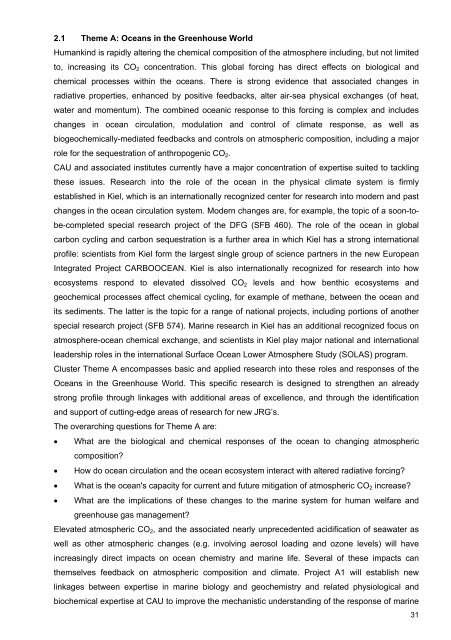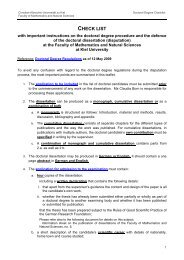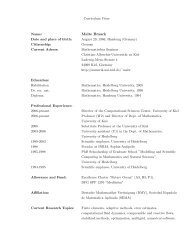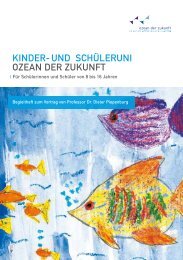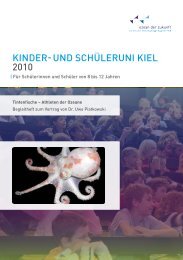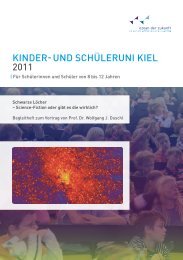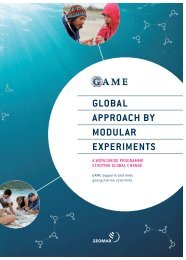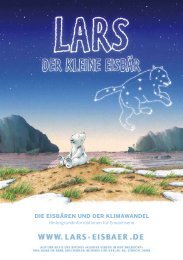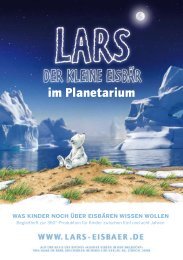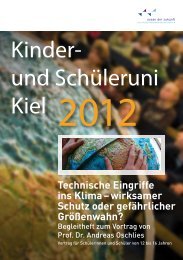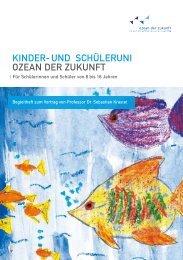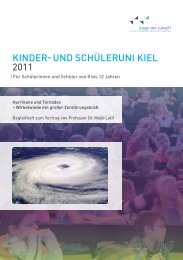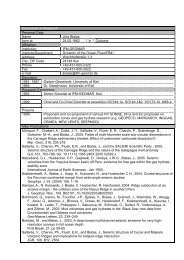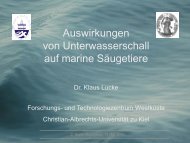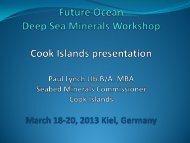Untitled - The Future Ocean
Untitled - The Future Ocean
Untitled - The Future Ocean
- No tags were found...
You also want an ePaper? Increase the reach of your titles
YUMPU automatically turns print PDFs into web optimized ePapers that Google loves.
2.1 <strong>The</strong>me A: <strong>Ocean</strong>s in the Greenhouse WorldHumankind is rapidly altering the chemical composition of the atmosphere including, but not limitedto, increasing its CO 2 concentration. This global forcing has direct effects on biological andchemical processes within the oceans. <strong>The</strong>re is strong evidence that associated changes inradiative properties, enhanced by positive feedbacks, alter air-sea physical exchanges (of heat,water and momentum). <strong>The</strong> combined oceanic response to this forcing is complex and includeschanges in ocean circulation, modulation and control of climate response, as well asbiogeochemically-mediated feedbacks and controls on atmospheric composition, including a majorrole for the sequestration of anthropogenic CO 2 .CAU and associated institutes currently have a major concentration of expertise suited to tacklingthese issues. Research into the role of the ocean in the physical climate system is firmlyestablished in Kiel, which is an internationally recognized center for research into modern and pastchanges in the ocean circulation system. Modern changes are, for example, the topic of a soon-tobe-completedspecial research project of the DFG (SFB 460). <strong>The</strong> role of the ocean in globalcarbon cycling and carbon sequestration is a further area in which Kiel has a strong internationalprofile: scientists from Kiel form the largest single group of science partners in the new EuropeanIntegrated Project CARBOOCEAN. Kiel is also internationally recognized for research into howecosystems respond to elevated dissolved CO 2 levels and how benthic ecosystems andgeochemical processes affect chemical cycling, for example of methane, between the ocean andits sediments. <strong>The</strong> latter is the topic for a range of national projects, including portions of anotherspecial research project (SFB 574). Marine research in Kiel has an additional recognized focus onatmosphere-ocean chemical exchange, and scientists in Kiel play major national and internationalleadership roles in the international Surface <strong>Ocean</strong> Lower Atmosphere Study (SOLAS) program.Cluster <strong>The</strong>me A encompasses basic and applied research into these roles and responses of the<strong>Ocean</strong>s in the Greenhouse World. This specific research is designed to strengthen an alreadystrong profile through linkages with additional areas of excellence, and through the identificationand support of cutting-edge areas of research for new JRG’s.<strong>The</strong> overarching questions for <strong>The</strong>me A are:• What are the biological and chemical responses of the ocean to changing atmosphericcomposition?• How do ocean circulation and the ocean ecosystem interact with altered radiative forcing?• What is the ocean's capacity for current and future mitigation of atmospheric CO 2 increase?• What are the implications of these changes to the marine system for human welfare andgreenhouse gas management?Elevated atmospheric CO 2 , and the associated nearly unprecedented acidification of seawater aswell as other atmospheric changes (e.g. involving aerosol loading and ozone levels) will haveincreasingly direct impacts on ocean chemistry and marine life. Several of these impacts canthemselves feedback on atmospheric composition and climate. Project A1 will establish newlinkages between expertise in marine biology and geochemistry and related physiological andbiochemical expertise at CAU to improve the mechanistic understanding of the response of marine31


